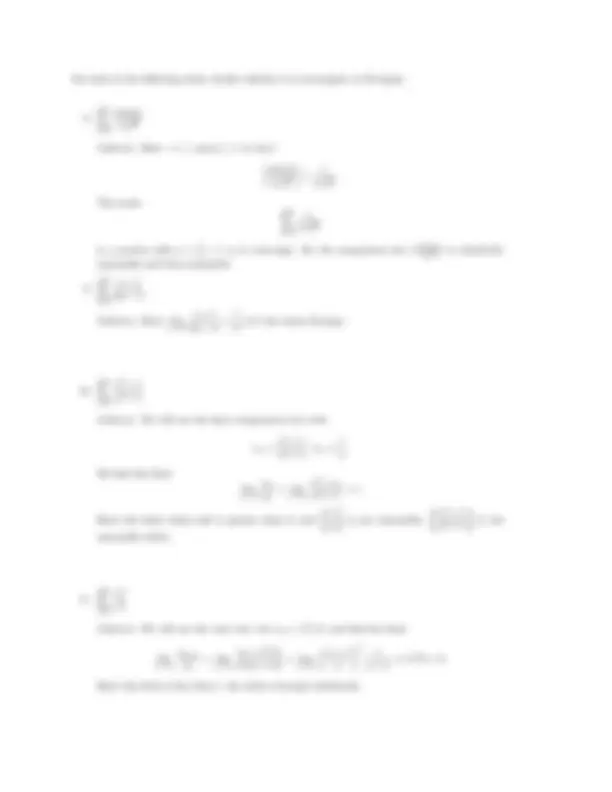



Study with the several resources on Docsity

Earn points by helping other students or get them with a premium plan


Prepare for your exams
Study with the several resources on Docsity

Earn points to download
Earn points by helping other students or get them with a premium plan
Community
Ask the community for help and clear up your study doubts
Discover the best universities in your country according to Docsity users
Free resources
Download our free guides on studying techniques, anxiety management strategies, and thesis advice from Docsity tutors
A math quiz focused on the concepts of convergence and summability of sequences and series. Students are required to decide if certain statements about sequences are always, sometimes, or never true, and to determine if specific series converge or diverge. The quiz covers topics such as the comparison test and limit comparison test.
Typology: Quizzes
1 / 2

This page cannot be seen from the preview
Don't miss anything!


Quiz 4 (Practice) Name
Math 253
July 21, 2009
Show all work. Answers without adequate justification will not receive credit.
For problems 1-7, assume ∞ ∑
n=
an = 5.
Decide if the following statements are ALWAYS true, SOMETIMES true, or NEVER true. Circle
the appropriate answer.
ALWAYS SOMETIMES NEVER The sequence {an} converges.
The sequence must converge to 0 since the series converges.
ALWAYS SOMETIMES NEVER The sequence {an} is summable.
Saying a sequence is summable is the same as saying the infinite series converges.
SOMETIMES NEVER The sequence {an} is absolutely summable.
∞ ∑
n=
n+
n ln(2)
ln(2)
∞ ∑
n=
n+
n
= 5, but
∞ ∑
n=
n+
n ln(2)
NEVER The sequence {an} diverges.
NEVER The sequence Sk =
∑k
n= an is summable.
The limit of the sequence {Sk} is 5, so the series
k= Sk cannot converge.
SOMETIMES NEVER The sequence {(−1) n an} is summable.
e.g. an = (−1)
n 1 n
ALWAYS SOMETIMES NEVER The sequence {n − 2 an} is summable.
Since an → 0 as n → ∞, the sequence an is bounded. In particular, there is some number M > 0
such that |an| < M for all n. Now we have
an
n 2
|an|
n 2
n 2
Since {
M n^2 } is summable, the sequence {
n
− 2 an
} is summable by the comparison test. In other
words {n
− 2 an} is absolutely summable, and thus it is also summable.
For each of the following series, decide whether it is convergent or divergent.
∞ ∑
n=
cos(n)
n
n
Solution: Since − 1 ≤ cos(n) ≤ 1 we have
cos(n)
n
n
n
n
The series ∞ ∑
n=
n
n
is a p-series with p =
3 2
1 so it converges. By the comparison test {
cos(n) n
√ n
} is absolutely
summable and thus summable.
∞ ∑
n=
n + 1
6 n − 5
Solution: Since lim n→∞
n + 1
6 n − 5
= 0, the series diverges.
∞ ∑
n=
n
2
n 3
Solution: We will use the limit comparison test with
an =
n 2
n 3
, bn =
n
We find the limit
lim n→∞
an
bn
= lim n→∞
n
3
n 3
Since the limit exists and is greater than 0, and
n
is not summable,
n
2
n^3 + 1
is not
summable either.
∞ ∑
n=
n
2
n!
Solution: We will use the ratio test. Let an = n
2 /n!, and find the limit
lim n→∞
an+
an
= lim n→∞
(n + 1)
2 n!
n 2 (n + 1)!
= lim n→∞
n + 1
n
n + 1
2 0 = 0.
Since the limit is less than 1, the series converges absolutely.